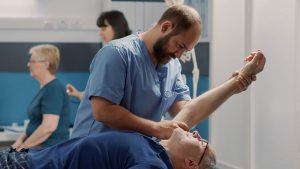It’s a well-known fact that muscle loss can be a side effect of aging. No matter how much work we put in when we’re younger, certain physical changes are going to make it much harder to maintain that hard-earned muscle, let alone gain more, when we’re old. Now, that’s not the same as saying that decline is inevitable. It just means you’re going to need some extra planning and effort if you want your muscle at its best.
Age-related muscle loss is known as sarcopenia and can start as young as 35. It’s normally about a 1%, maybe 2% decline a year, although it may increase once you’re past 60. Not everyone will lose muscle at the same rate. People with severe sarcopenia are more likely to experience falls, chronic pain, disease, and other health problems. It can also make the activities of daily living – ordinary things like going shopping or brushing your teeth – much harder.
There are a few things that contribute to sarcopenia. Muscle fibers deteriorate and are not fully replaced. Energy-producing mitochondria become less efficient and reduce in number. Your testosterone levels drop. Nerve signals are no longer transmitted properly. It all adds up, but it’s not the end of the story.
The single best thing you can do to combat age-related muscle loss is to keep exercising. Weight training in particular is good for encouraging your muscles to keep building, repairing and growing. It can be a bit trickier than it was in your youth, so it may help to find a personal trainer with experience working with older clients, but it’s by no means impossible.
You just need to be aware of any limitations you may face in terms of things like mobility. You still need to work with your body, not against it. Consider doing fewer repetitions, for example, although you can still use heavier weights (unless it’s too uncomfortable). Pay extra attention to your legs if you want to avoid falls and stay comfortable walking. Take your recovery periods and rest days more seriously so you have time to heal.
Sarcopenia is no reason to despair. Research suggests that if you keep doing your strength training, its effects can be muted and maybe even outright stopped. There’s even a suggestion that the decline can be reversed if you have already started losing muscle.




